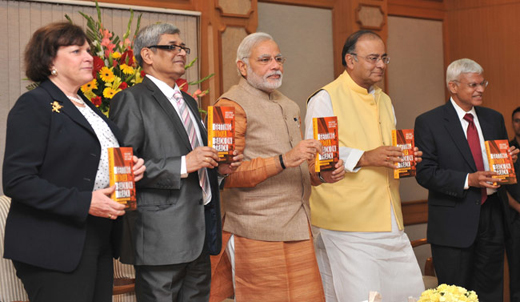Modi seeks ’skill, scale and speed’ to compete with China
Mangaloretoday.com/IT
New Delhi, June 09: Prime Minister Narendra Modi on Sunday said the country needed skill, scale and speed to compete with China.
"We need to understand demographic dividend of our nation, if we want to progress our nation. We need to stress upon three factors, Skill, Scale & Speed, if we look forward to compete with China," he said at a book launch function, a day before he meets visiting Chinese foreign minister Wang Yi.

He released ’Getting India Back on Track: An Action Agenda for Reform’ edited by Bibek Debroy, Ashley J. Tellis and Reece Trevor and published by Carnegie Endowment for International Peace.
Modi said the input of intellectual think tanks should be substantially enhanced for better policy frameworks.
He said in infrastructure, the focus needed to shift from highways to "i-ways" and optical fibre networks.
He said cities in the past were built on river-banks.
They are now built along highways. But in future, they will be built, based on availability of optical-fibre networks and next-generation infrastructure, he said.
The Prime Minister said urbanisation should not be treated as a problem, but as an opportunity.
"If we have to generate employment and change for the better, we plan to build 100 smart cities."
The Prime Minister cited three colours of the National Flag to suggest agendas of growth.
Beginning with green, he said we need to bring about a second green revolution - focusing on increased agro-productivity, value addition, agro technology, and decentralization of warehousing.
Referring to white, he said a white revolution must now focus on increasing milk productivity, and developing a support system for ensuring cattle health.
He said saffron represented energy. "We need a saffron revolution that focuses on renewable energy sources such as solar energy, to meet India’s growing energy demand."
"I know when I say saffron, people here become alert. But saffron is a symbol of energy," he said.
Inspired by the blue colour of the Ashok Chakra, he said the blue revolution should focus on the fisheries sector, including ornamental fish.
Modi also stressed on the need for water conservation, and emphasised the importance of micro-irrigation, which would lead to "per drop, more crop."
He said that micro-irrigation had been successful in improving productivity and quality in crops like sugarcane in Gujarat.
He said there was need to exploit the demographic dividend, as 65 per cent of our population was below 35 years of age.
For this skill development needs to be a priority area. Referring to skills such as teaching, nursing and paramedics, he said good teachers were one of the biggest needs of society, but there are very few good teachers available.
Can India become an exporter of good teachers who would capture the imagination of an entire generation globally, the Prime Minister asked.
Talking about the need to combat the challenge of global warming and climate change, the Prime Minister said that a civilisation that treated rivers as mothers did not need to learn about environment protection from a western mindset.
- JEE Mains: Six Expert PU College Students Score 100 Percentile in Individual Subjects
- Govt Will Not Rush Caste Census Decision: D.K. Shivakumar
- 18-Year-Old Girl Goes Missing in Mangaluru
- Bantwal Rural Police Crack Cloth Shop Theft Case in Farangipete
- Deputy CM DK Shivakumar Offers Prayers at Dharmashala Temple
- Sharpshooter Suspected in Ricky Rai Attack, Police Probe Rivalries
- Video of Five Riding a Scooter Sparks Outrage in Manipal
- Thumbe Dam Reaches Full Capacity, Ensures 40 Days of Water Supply for Mangaluru
- Three Sentenced to Triple Life Imprisonment in 2014 Mangaluru Double Murder Case
- Palimar Seer condemn denial of CET entry over ’Janivara’; Demand retest for affected student
- Case Filed Against Three for Blocking Traffic during protest against Waqf Amendment Act in Adyar
- Mangaluru: Commissioner denies misuse of police vehicle during Waqf protest, cites medical emergency
- Belthangady: Autorickshaw overturns near Ujire; driver seriously injured
- Opposition Slams BJP MPs’ Criticism of Supreme Court; BJP Distances Itself
- Honour to speak with PM Modi, will visit India later this year: Elon Musk
- India tears into Yunus regime over Hindu leader’s killing in Bangladesh
- Two homeguards suspended for asking students to remove sacred thread at Shivamogga college
- Caste census report politically motivated, says R Ashoka
- PM Modi to visit Saudi Arabia from April 22-23
- 4 dead, many feared trapped as building collapses in Delhi’s Mustafabad
- Kerala teacher acquitted as student confesses fake rape allegation
- CET officials booked for asking students to remove sacred thread at exam centre in Shivamogga
- BJP worker found hanging in Bengaluru outskirts, video message names ‘local leader’
- CET row: Karnataka govt orders probe after students asked to remove sacred thread
- Man who flashed woman, assaulted 7 people arrested in Bengaluru
- Skills and Competencies Take Center Stage at MSN Dialogue Series
- Court remands Maoist Lakshmi to six-day police custody
- Sandhya Shenoy honored with Society for Materials Chemistry Medal-2024
- White Cornus Apartment in Mangaluru
- City girl wins first place in state-level spell bee competition
- Alleged ‘Love Jihad’ Case in Mangaluru: Woman left home voluntarily, says police
- Girl fatally struck by reckless two-wheeler near Belman
- New residential complex for the judges inaugurated in Mangaluru
- Absconding accused nabbed after 8 years
- Truck with cylinders turns turtle in Beltangady
- Bhoota Kola artist dies of cardiac arrest
- Development of the country should be our goal: Ganesh Karnik
- Container truck gets stuck under Modankap railway bridge
- Truck crushes bike’s pillion rider near BC Road
- Head constable dies of heart attack
- CITY INFORMATION
- TRAVEL
- TOURIST INFORMATION
- HEALTH CARE
- MISCELLANEOUS




 Write Comment
Write Comment E-Mail To a Friend
E-Mail To a Friend Facebook
Facebook Twitter
Twitter  Print
Print 


